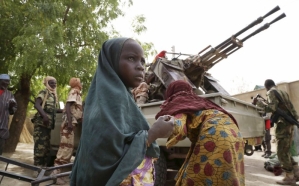
The Nigerian terror group known as Boko Haram has been infamous for conducting kidnappings and massacres on a large scale. Now its militants may have kidnapped up to 500 women and children in its latest attempt as part of a possible tactical strategy.
According to Terrence McCoy of the Washington Post, hundreds of women and children have been reported from the recently liberated town of Damasak. Although the reports from the region are unclear about the actual number of people supposedly abducted, the latest incident highlighted the brutality Boko Haram practiced in that part of the world.
"They took 506 young women and children," trader Solueymane Ali said of Boko Haram's actions. "We don't know if they killed others after leaving, but they took the rest with them."
According to McCoy, the trader added that even members of his own family, including his wife and three daughters, were kidnapped by Boko Haram, which justified the abductions by claiming that they were considered "slaves."
"Two of them were supposed to get married this year," Ali said.
However, former U.S. ambassador to Nigeria John Campbell told Jack Moore of Newsweek that Boko Haram engaged in such tactics as a mode of survival. The senior fellow for Africa policy studies at the Council of Foreign Relations thought that the terror group exposed a weakness within Nigeria's strategy in taking out the militants in conducting the abductions.
"The significance of this kidnap illustrates quite clearly that it is possible to roll Boko Haram's occupation of territory back, but without defeating it," Campbell said. "It managed to drive them out of a particular locale without defeating them."
Campbell added that it was a strategy that previously worked for Boko Haram.
"The nature of Boko Haram is that it can be driven out of a territory but it simply melts back into the countryside or into the slums and continues on," Campbell said. "We saw this after Mohammed Yusef's [former Boko Haram leader] murder in 2009, when Boko Haram went underground only to re-emerge in 2011."
McCoy argued that mass kidnappings helped further Boko Haram's reign of terror, noting that it was "an effective method of swelling their ranks."
"The kidnapped are used as soldiers. They're used as wives," McCoy wrote. "They're used as bargaining chips. They're used as cooks, as suicide bombers and as future soldiers. Boko Haram, unlike the Islamic State, doesn't worry about attracting fresh recruits. They simply take them."
Jacob Zenn of West Point's Combating Terrorism Center told McCoy that the Chibook mass kidnapping of schoolgirls back in April 2014 was a turning point in the fight against Boko Haram. He argued that although the schoolgirls themselves were not used as combat fodder, there could be an "operation link between the kidnapping in Chibok and the deployment of the female suicide bombers."
"Only after the Chibok kidnapping did Boko Haram start using women in operations," Zenn wrote.
According to McCoy, Boko Haram seemed to treat its conscripts and kidnap victims in an expendable manner. Elizabeth Donnelly, assistant head of Chatham House's Africa program in London, elaborated on the terror group's tactics.
"Using children to carry and detonate explosives is not a new tactic for Boko Haram, but it is an intensification," Donnelly said. "Boko Haram has been abducting and conscripting children and young men and women for a long period for various purposes. They will be seen by the movement as expendable resources."
Moore cited information from the Council on Foreign Relations that stated Boko Haram has killed over 10,000 people in 2014. The death toll from the terror group so far in 2015 has reached more than 2,000 people.







